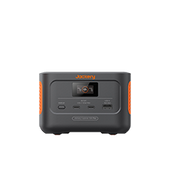Backup Healthcare Power Solutions: How Solar Power Stations are Saving Lives
Healthcare facilities have a major responsibility to ensure that critical machinery and equipment, such as patient monitors, respiratory ventilators, etc., are kept up and running to continuously meet the needs of their patients.
Not to mention, dependable IT servers and computers are needed to access patient medical records and devise an effective treatment plan for quality health care.
However, power outages and other power disruptions pose a constant threat to the safe, 24/7 running of these operations each day.
Hence, many medical buildings, long-term care facilities, and more are turning to solar power stations as a reliable backup power source.
Solar Power Stations: Powering Healthcare Systems
Healthcare facilities commonly rely on diesel generators to keep their electronics running smoothly during power outages.
However, since they operate using fuel, it means they release emissions. This contributes to air pollution, which increases the facility's carbon footprint each time they are used. In some cases, the diesel exhaust can complicate certain medical conditions, such as asthma and lung and heart diseases.
Solar power stations, on the other hand, use solar technology, such as PV panels, to harvest the sun's light to generate electricity. As the sun's rays penetrate the PV panels, they are absorbed by the PV cells, which then convert them into DC voltage.

The DC voltage is then sent to the inverter, where it is transformed into AC voltage, which is the same electric current used by your home or workplace to power the appliances and electronics. Or, depending on your system, the DC voltage can be stored in a battery for later use.
In either case, a solar power station provides a clean and renewable source of energy that can help to keep critical medical systems running during power outages.
Healthcare Emergency Power Generator
Solar power provides a more reliable energy source to power critical medical equipment during natural disasters, such as hurricanes, earthquakes, etc., when diesel generators risk running out of fuel and weather conditions prevent additional fuel from being obtained. Fuel costs can also be especially high during these times due to scarcity. This makes solar power stations a lower-costing alternative.
Also, with solar stations being an environmentally-friendly renewable resource, there are no emissions. This definitely improves indoor air quality, which is critical for healthcare facilities. Solar photovoltaic (PV) systems can be used to power anything from small medical devices to an entire hospital wing.
Solar generators have many applications in the healthcare industry. For example, they can provide backup power for x-ray machines, MRIs, CT scans, and other life-saving medical equipment. They can also keep lights and refrigeration running to preserve medicines. And, in the event of a power outage, solar generators can provide enough electricity to keep critical systems running until grid power is restored.
If you are responsible for designing or maintaining a healthcare facility, consider adding solar generators to your emergency power plan.
Backup Power for Medical Equipment
Jackery Explorer Portable Power Stations are an ideal alternative to backup power for medical equipment. With a wide range of outputs, they can provide the energy you need to keep your equipment running in an emergency.
Jackery portable power stations are designed with portability and durability in mind. They are perfect for use in any situation where you might need a backup power source, including medical emergencies. With various models available, you can find the perfect one for your needs.

CPAPs are one of the most common medical devices people use at home that require backup power. CPAPs or Continuous Positive Airway Pressure is a device used to help people with sleep apnea breathe more easily during the night.
Jackery has various options available to keep your CPAP running in an emergency. For instance, the Jackery Solar Generator 500 (Explorer 500 + SolarSaga 100W) can be used to keep your CPAP running for up to 9 hours on a single charge. The Explorer 500 power station can also charge various AC-relied devices under 500 watts, such as laptops, electric blankets, phones, air pumps, and more. Weighing just 9.1 pounds, it's highly portable, which makes it perfect for bringing with you on the go.
Another option is the Jackery Solar Generator 1000 (Explorer 1,000 + SolarSaga 100W), which feature a 2,000W surge solar generator with 1,000 running wattage, 2,000 surge wattage, and a larger 1002Wh capacity for moderate charging needs. In addition, it has 2 AC outlets and 2-USB-C ports for emergency lights, laptops, CPAP machines, phones, and more. There is also a 3.0 quick charge port which can be used to charge laptops and other high-powered devices.
In the event of a power outage, your medical equipment is vulnerable. Having a backup power source can mean the difference between life and death. Jackery portable power stations give you peace of mind knowing that you have a reliable power source when you need it most.
Conclusion
Solar energy is not just for those looking to live off the grid. Healthcare solar systems are becoming increasingly popular as the technology continues to evolve and become more affordable. Solar power can provide a reliable and renewable source of energy for healthcare facilities while also helping to manage backup power costs and reducing the environmental impact of the facility.
If you’re looking for a sustainable solution for your healthcare facility, solar power may be the right choice for you. To learn more about your options for portable solar power stations for healthcare emergency power, subscribe to Jackery's newsletter for exclusive deals and updates.





























































































